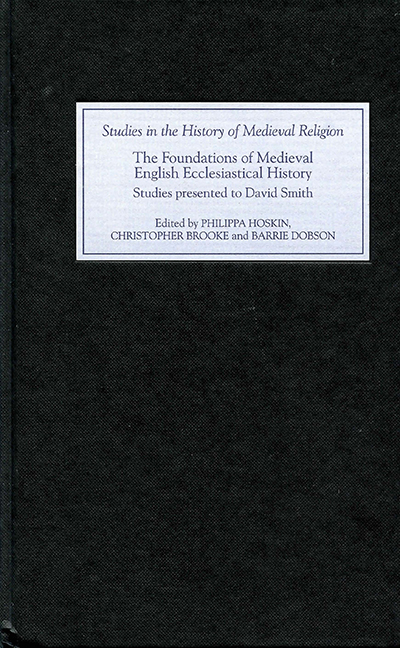Book contents
- Frontmatter
- Contents
- List of Contributors
- Acknowledgements
- Abbreviations
- Miscellaneous Frontmatter
- David Smith: the Scholar
- ‘The archivist is not and ought not to be a historian.’ David Smith and the Borthwick Institute
- Why Forge Episcopal Acta? Preliminary Observations on the Forged Charters in the English Episcopal Acta Series
- Pastors and Masters: the Beneficed Clergy of North-East Lincolnshire, 1290–1340
- The Convent and the Community: Cause Papers as a Source for Monastic History
- Patriarchy and Patrimony: Investing in the Medieval College
- ‘Above all these Charity’: the Career of Walter Suffield, Bishop of Norwich, 1244–57
- The Law of Charity and the English Ecclesiastical Courts
- Continuing Service: the Episcopal Households of Thirteenth-Century Durham
- The Acta of English Rural Deans in the later Twelfth and early Thirteenth Centuries
- The Court of Arches and the Bishop of Salisbury
- Bishops’ Registers and Political History: a Neglected Resource
- The Vatican Archives, the Papal Registers and Great Britain and Ireland: the Foundations of Historical Research
- Bibliography of the Writings of David Smith
- Index
- Tabula Gratulatoria
Patriarchy and Patrimony: Investing in the Medieval College
Published online by Cambridge University Press: 24 October 2017
- Frontmatter
- Contents
- List of Contributors
- Acknowledgements
- Abbreviations
- Miscellaneous Frontmatter
- David Smith: the Scholar
- ‘The archivist is not and ought not to be a historian.’ David Smith and the Borthwick Institute
- Why Forge Episcopal Acta? Preliminary Observations on the Forged Charters in the English Episcopal Acta Series
- Pastors and Masters: the Beneficed Clergy of North-East Lincolnshire, 1290–1340
- The Convent and the Community: Cause Papers as a Source for Monastic History
- Patriarchy and Patrimony: Investing in the Medieval College
- ‘Above all these Charity’: the Career of Walter Suffield, Bishop of Norwich, 1244–57
- The Law of Charity and the English Ecclesiastical Courts
- Continuing Service: the Episcopal Households of Thirteenth-Century Durham
- The Acta of English Rural Deans in the later Twelfth and early Thirteenth Centuries
- The Court of Arches and the Bishop of Salisbury
- Bishops’ Registers and Political History: a Neglected Resource
- The Vatican Archives, the Papal Registers and Great Britain and Ireland: the Foundations of Historical Research
- Bibliography of the Writings of David Smith
- Index
- Tabula Gratulatoria
Summary
The collegiate church is something of an under-studied phenomenon. Commonly considered to have declined from the early twelfth century, its renaissance was only to come after the Black Death, in the form of the chantry college. Those colleges which existed during the period between the Conquest and the Pestilence of 1348–49 have been considered by historians principally in terms of their role as alternative or additional sources of patronage: for bishops, limited by their cathedral chapters, and likewise for the Crown and some secular lords, fostering similarly burgeoning administrations. The provision of patronage is undoubtedly a pivotal role of the collegiate church and, while it should not be underestimated, its prevalence as a defining motif in the history of these institutions tends to obscure their wider relevance. Aside from colleges’ spiritual functions (their performance of liturgical and often parochial duties) and the intercessory value they held for their patrons, it is clear that the medieval college was both a more important and a more vibrant institution in the period 1100–1350 than historians have generally allowed. Indeed, colleges can be seen to have fulfilled other roles – not always created intentionally or codified in statutes or constitutions – which were integral to wider structures and trends and which shaped their development and supported their survival. A more extensive and detailed study of the collegiate church is necessary to identify the true extent and nature of these roles, but consideration of the current available evidence suggests a few areas of interest that highlight the structural significance of the medieval college. In particular, the cartulary of St Mary's, Warwick, a secular college in the diocese of Worcester, founded c.1123 by the earls of Warwick, and edited under the supervision of Professor David Smith, provides valuable examples. More so when considered in relation to the wider range of primary and prosopographical sources (episcopal registers and acta, cartularies and lists of fasti) of the type sponsored and advanced, in no small part, by David's scholarship.
- Type
- Chapter
- Information
- The Foundations of Medieval English Ecclesiastical HistoryStudies Presented to David Smith, pp. 77 - 93Publisher: Boydell & BrewerPrint publication year: 2005



